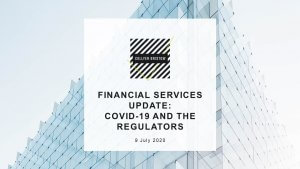- Banking & financial disputes
- Financial services

Longer Reads
English court denies claim by foreign software giant to enforce US judgment
The High Court has declined to allow the enforcement of a US$26 million damages award issued by a US District Court. In an interesting decision, it held the claimants were precluded, either by issue estoppel or by abuse of process from enforcing the US judgment. The court also remarked that English courts are prohibited by statute from entertaining the recovery of any sum under a foreign judgment for multiple damages, and ordered the repayment of the non-compensatory part of the award by the creditor to the debtor.
3 minute read
Published 18 April 2019
Key information
Background
The Claimant (“SAS“) sought to enforce against World Programming Limited (“WPL”) a US$26 million compensatory damages order (“theUS Judgment“) made in the United States District Court for the Eastern District of North Carolina, Western Division (“the US Court“).
SAS was a software developer which had cornered the market with one of its analytical products. Perceiving market demand for a viable alternative, WPL developed a similar product which successfully emulated the functionality of SAS’ software. In order to do so, WPL obtained a licence to use SAS’ product and had thoroughly investigated it.
SAS regarded WPL’s actions as a breach of its intellectual property rights and licence agreements and sued WPL in England (“the English Proceedings“). However, WPL defeated SAS’s claims, in essence because the courts ruled that:
- creation of the alternative software involved no copyright infringement; and
- any terms of the software licence prohibiting WPL’s pro-competitive actions were null and void by operation of the European Software Directive (“the Software Directive”).
Subsequent to commencing the English Proceedings, SAS also issued proceedings in the US (“the US Proceedings“), including claims for copyright infringement, fraudulent inducement to contract (“the Fraud Claim”) and a statutory claim for contravention of the North Carolina Unfair and Deceptive Trade Practices Act (“the UDTPA Claim”).
The essence of the Fraud Claim was that WPL induced SAS to grant access to its software system by representations that it intended to comply with the licence terms; when the true position was that WPL had no such intention at the time of entering into the licence agreement. The UDTPA Claim was also based on that fraud case.
SAS succeeded in both claims, winning a compensatory damages award in excess of US$26 million, which it then sought to enforce in England (where WPL is incorporated and carries on business). Importantly, in relation to the UDTPA Claim, the US Court held that it was bound to award punitive damages calculated by multiplying the compensatory award by a factor of three. Although the multiplied elements of that award were not pursued for enforcement before the English court, they would nonetheless prove to be fatal to SAS’ claim.
Decision
The Court held that SAS were precluded, either by issue estoppel or by abuse of process, from enforcing the judgment on the Fraud Claim and the UDTPA Claim.
Under the doctrine of issue estoppel, a foreign judgment will not be recognised if it is inconsistent with a previous decision of an English court in proceedings between the same parties. As distinct from issue estoppel, the abuse of process rule in Henderson v Hendersonrequires litigants to bring their whole case before the courts so that all aspects of it may be finally decided, once and for all. Whilst these are separate principles, they shoot at the same target – that of guaranteeing finality in litigation and ensuring no party is vexed twice in the same matter.
In the present instance, SAS’s enforcement claim fell foul of both those principles, including for the following reasons:
- The Fraud Claim was fundamentally reliant upon the existence of a licence agreement that had already been deemed null and void by the English court (i.e. by virtue of the Software Directive). The English court further concluded that, as a matter of US law, the Fraud Claim was dependent on establishing “actual damage” as a result of non-adherence to a contractual term – a contractual term which, as a matter of English law, did not exist.
- Both the Fraud Claim and the UDTPA Claim could and should have been, but were not, brought in the English Proceedings. The court held that, at the time when SAS brought its English claim, it was aware of all the necessary facts to substantiate a plea in fraud against WPL (as a matter of English Law) and could also have advanced its UDTPA claims as a matter of North Carolina Law. There being no good reason why SAS had failed to do so, the court held its actions to be an abuse of process.
Albeit that SAS’ enforcement claim wholly failed (including for the above-mentioned reasons), the court in any event went on to consider whether recovery of the UDTPA Claim award would have been barred as a result of the prohibition against multiple damages awards under the Protection of Trading Interests Act 1980 (“the PTIA”).
SAS submitted that the protections under the PTIA were not engaged because the US Court had carefully separated (in its judgment) the compensatory aspects of the award from the additional punitive part reached by trebling the compensatory element. SAS argued that this allowed the compensatory part of the award to survive and be enforced. In fact, the US Court had also remarked that “a clear demarcation between compensatory and non-compensatory damages will aid in the execution” of its judgment.
The English court, however, disagreed. As Mrs Justice Cockerill explained, the focus of the PTIA (in the present context) is to protect English entities from causes of action that attract punitive or multiple damages (i.e. such as those found under the UDTPA). The statute therefore prohibits English courts from entertaining the recovery of any sum under a judgment for multiple damages. If there is a judgment based on multiplication, then no part of it may be enforced in England.
Counterclaim
The Court also went one step further, allowing WPL to recover part of the damages which it had already paid to SAS under the US Judgment.
Section 6 of the PTIA allows a UK entity to recover the non-compensatory part of any monies paid by it under a foreign judgment for multiple damages. WPL therefore argued (by way of counterclaim) that it should be allowed to recoup two-thirds of the US$4.3 million that SAS had already recovered from it in the US. SAS rejected his argument. It said that none of the moneys paid by WPL were on account of “multiple damages”, because SAS had not even yet recovered the value of the compensatory part of the US Judgment (i.e. £26million).
The court sided with WPL. It emphasised that, under the PTIA, the US Court’s ruling (as a whole) was a judgment for multiple damages. Further, any monies paid by WPL to SAS are assumed to be amounts in satisfaction of the judgement at large. Unless, at the time of payment, an amount was specifically attributed to the compensatory element of a judgment for multiple damages, that payment will fall within the ambit of section 6 of the PTIA. In those circumstances, a payer will be able to recover on account of the non-compensatory element of the judgment. WPL was therefore permitted to recoup two-thirds of the damages that it had already paid to SAS.
This decision might shock some parties who are engaged in multi-jurisdictional litigation. However, the underlying principles applied by Mrs Justice Cockerill are well established. Right from the outset, potential litigants should consider how the formulation of their US claim (or other foreign claim) might impact upon their prospects of later enforcing a judgment in England.
Related content
Longer Reads
English court denies claim by foreign software giant to enforce US judgment
The High Court has declined to allow the enforcement of a US$26 million damages award issued by a US District Court. In an interesting decision, it held the claimants were precluded, either by issue estoppel or by abuse of process from enforcing the US judgment. The court also remarked that English courts are prohibited by statute from entertaining the recovery of any sum under a foreign judgment for multiple damages, and ordered the repayment of the non-compensatory part of the award by the creditor to the debtor.
Published 18 April 2019
Associated sectors / services
Authors
Background
The Claimant (“SAS“) sought to enforce against World Programming Limited (“WPL”) a US$26 million compensatory damages order (“theUS Judgment“) made in the United States District Court for the Eastern District of North Carolina, Western Division (“the US Court“).
SAS was a software developer which had cornered the market with one of its analytical products. Perceiving market demand for a viable alternative, WPL developed a similar product which successfully emulated the functionality of SAS’ software. In order to do so, WPL obtained a licence to use SAS’ product and had thoroughly investigated it.
SAS regarded WPL’s actions as a breach of its intellectual property rights and licence agreements and sued WPL in England (“the English Proceedings“). However, WPL defeated SAS’s claims, in essence because the courts ruled that:
- creation of the alternative software involved no copyright infringement; and
- any terms of the software licence prohibiting WPL’s pro-competitive actions were null and void by operation of the European Software Directive (“the Software Directive”).
Subsequent to commencing the English Proceedings, SAS also issued proceedings in the US (“the US Proceedings“), including claims for copyright infringement, fraudulent inducement to contract (“the Fraud Claim”) and a statutory claim for contravention of the North Carolina Unfair and Deceptive Trade Practices Act (“the UDTPA Claim”).
The essence of the Fraud Claim was that WPL induced SAS to grant access to its software system by representations that it intended to comply with the licence terms; when the true position was that WPL had no such intention at the time of entering into the licence agreement. The UDTPA Claim was also based on that fraud case.
SAS succeeded in both claims, winning a compensatory damages award in excess of US$26 million, which it then sought to enforce in England (where WPL is incorporated and carries on business). Importantly, in relation to the UDTPA Claim, the US Court held that it was bound to award punitive damages calculated by multiplying the compensatory award by a factor of three. Although the multiplied elements of that award were not pursued for enforcement before the English court, they would nonetheless prove to be fatal to SAS’ claim.
Decision
The Court held that SAS were precluded, either by issue estoppel or by abuse of process, from enforcing the judgment on the Fraud Claim and the UDTPA Claim.
Under the doctrine of issue estoppel, a foreign judgment will not be recognised if it is inconsistent with a previous decision of an English court in proceedings between the same parties. As distinct from issue estoppel, the abuse of process rule in Henderson v Hendersonrequires litigants to bring their whole case before the courts so that all aspects of it may be finally decided, once and for all. Whilst these are separate principles, they shoot at the same target – that of guaranteeing finality in litigation and ensuring no party is vexed twice in the same matter.
In the present instance, SAS’s enforcement claim fell foul of both those principles, including for the following reasons:
- The Fraud Claim was fundamentally reliant upon the existence of a licence agreement that had already been deemed null and void by the English court (i.e. by virtue of the Software Directive). The English court further concluded that, as a matter of US law, the Fraud Claim was dependent on establishing “actual damage” as a result of non-adherence to a contractual term – a contractual term which, as a matter of English law, did not exist.
- Both the Fraud Claim and the UDTPA Claim could and should have been, but were not, brought in the English Proceedings. The court held that, at the time when SAS brought its English claim, it was aware of all the necessary facts to substantiate a plea in fraud against WPL (as a matter of English Law) and could also have advanced its UDTPA claims as a matter of North Carolina Law. There being no good reason why SAS had failed to do so, the court held its actions to be an abuse of process.
Albeit that SAS’ enforcement claim wholly failed (including for the above-mentioned reasons), the court in any event went on to consider whether recovery of the UDTPA Claim award would have been barred as a result of the prohibition against multiple damages awards under the Protection of Trading Interests Act 1980 (“the PTIA”).
SAS submitted that the protections under the PTIA were not engaged because the US Court had carefully separated (in its judgment) the compensatory aspects of the award from the additional punitive part reached by trebling the compensatory element. SAS argued that this allowed the compensatory part of the award to survive and be enforced. In fact, the US Court had also remarked that “a clear demarcation between compensatory and non-compensatory damages will aid in the execution” of its judgment.
The English court, however, disagreed. As Mrs Justice Cockerill explained, the focus of the PTIA (in the present context) is to protect English entities from causes of action that attract punitive or multiple damages (i.e. such as those found under the UDTPA). The statute therefore prohibits English courts from entertaining the recovery of any sum under a judgment for multiple damages. If there is a judgment based on multiplication, then no part of it may be enforced in England.
Counterclaim
The Court also went one step further, allowing WPL to recover part of the damages which it had already paid to SAS under the US Judgment.
Section 6 of the PTIA allows a UK entity to recover the non-compensatory part of any monies paid by it under a foreign judgment for multiple damages. WPL therefore argued (by way of counterclaim) that it should be allowed to recoup two-thirds of the US$4.3 million that SAS had already recovered from it in the US. SAS rejected his argument. It said that none of the moneys paid by WPL were on account of “multiple damages”, because SAS had not even yet recovered the value of the compensatory part of the US Judgment (i.e. £26million).
The court sided with WPL. It emphasised that, under the PTIA, the US Court’s ruling (as a whole) was a judgment for multiple damages. Further, any monies paid by WPL to SAS are assumed to be amounts in satisfaction of the judgement at large. Unless, at the time of payment, an amount was specifically attributed to the compensatory element of a judgment for multiple damages, that payment will fall within the ambit of section 6 of the PTIA. In those circumstances, a payer will be able to recover on account of the non-compensatory element of the judgment. WPL was therefore permitted to recoup two-thirds of the damages that it had already paid to SAS.
This decision might shock some parties who are engaged in multi-jurisdictional litigation. However, the underlying principles applied by Mrs Justice Cockerill are well established. Right from the outset, potential litigants should consider how the formulation of their US claim (or other foreign claim) might impact upon their prospects of later enforcing a judgment in England.
Associated sectors / services
- Banking & financial disputes
- Financial services
Authors
Need some more information? Make an enquiry below.
Subscribe
Please add your details and your areas of interest below
Article contributors
Robin
HenryPartner - Head of Dispute Resolution Services
Specialising in Banking & financial disputes, Commercial disputes, Corporate recovery, restructuring & insolvency, Financial regulatory and Personal insolvencyJean-Martin
LouwAssociate
Specialising in Commercial disputes, Banking & financial disputes, Commercial arbitration and Financial regulatory
Enjoy reading our articles? why not subscribe to notifications so you’ll never miss one?
Subscribe to our articlesMessage us on WhatsApp (calling not available)
Please note that Collyer Bristow provides this service during office hours for general information and enquiries only and that no legal or other professional advice will be provided over the WhatsApp platform. Please also note that if you choose to use this platform your personal data is likely to be processed outside the UK and EEA, including in the US. Appropriate legal or other professional opinion should be taken before taking or omitting to take any action in respect of any specific problem. Collyer Bristow LLP accepts no liability for any loss or damage which may arise from reliance on information provided. All information will be deleted immediately upon completion of a conversation.
Close










































































